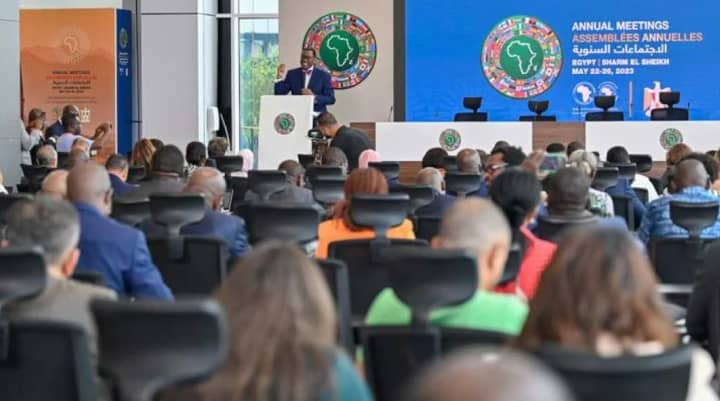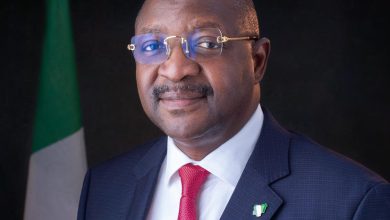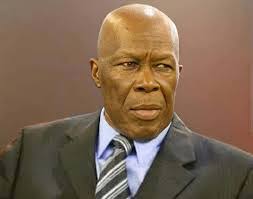ADB 2023 Confab: Dearth of climate finance by industrial nations choking Africa-Dr Adesina

Global warming is the world’s biggest harbinger of economic, social and humanitarian crisis. These humongous climatic calamities, topped the agenda at the on-going 2023 annual Africa Development Bank(ADB) grandiose meeting, in the exotic International Convention Center, in the sublime sea city of Sharm El Sheikh, Egypt. Prolific writer and award-winning journalist cum author, ADEZE OJUKWU, exquisitely, captures the event, in this beautiful article. Enjoy the compelling narration.
The on-going African Development Bank(ADB) Group’s 58th Annual meeting at the exotic Sharm El Sheikh International Convention Center, Egypt, is quite huge and historic. The array of high-net-worth experts in attendance is phenomenal. The discussions are equally phenomenal, while the theme is compelling.
Many African leaders, their Arab counterparts and top chief executives from several high-tech corporations, financial giants and global pharmaceutical conglomerates were in the spectacular conference.
Given the devastating impact of global warming on Africa, despite its low emission status, the theme of the high-profile meeting was aptly christened: “Mobilizing private sector financing for climate and green growth in Africa.”
Visibly irked by the failure of developed nations to fulfill their annual financial pledges on climate change, despite ample evidence that their industrial and technological operations, contribute significantly to extreme climatic calamities, President of ADB, Dr. Akinwumi Adesina, kicked off the international gathering, with a sharp criticism of these countries, for not remitting their $100 billion annual pledges.
According to him, lack of adequate financing for tackling climate change in Africa has become dire and was “choking” the continent.”
While addressing, scores of journalists from Africa and around the world at a televised media lunch organized, monitored by this writer, to commence the grandiose meeting, Adesina “called out developed nations for not honoring the $100 billion-a-year climate finance pledge they made to developing countries.”
“Africa is being short-changed in climate finance. Africa is choking,” he lamented, while underscoring the need to support Africa to mitigate the severity of climate change across its region,” he stressed.
He appealed to the media to join ADB and the region, to condemn this funding gap, with a view to reversing the current adverse consequences that have forced Africa, to bear a disproportionate burden of climate crises.
In his characteristic manner, the ADB chief reeled out numerous success stories that were recorded by the bank, particularly under his administration. He also took time to roll out several ambitious projects that will be undertaken by the finance institution, in partnership with the private sector to support acceleration of growth and progress across the region, which is currently ravaged by bad governance, political crises, insecurity, hunger, blood conflicts and wars.
The topmost project, from his agenda is the establishment of the gargantuan African Pharmaceutical Technology Foundation (APTF).
Adesina spoke, extensively about this health initiative, which, according to him will jump start the continent’s health and pharmaceutical system from its current weak and beggarly status to a super self-sufficient industry.

His words: “The foundation, a pan-African agency, was set up by the African bank in response to a call by African Union(AU) member states to create a dedicated institution to address the long-standing technology gaps in the region’s pharmaceutical sector. It will work to promote technology access and transfer and facilitate technological upgrading of relevance to the pharmaceutical sector for Africa.”
“The foundation’s work will focus on bringing together global and other southern private sector companies, and public sector research institutions with their counterparts in Africa. The scheme will also launch several dedicated programs that will focus on enhancing technology absorption in Africa’s private and public sectors.”
Underscoring the significance of the theme, the bank chief said “it was chosen to draw attention to the urgent need for climate finance. Anywhere you look in Africa today, climate change is causing havoc,” Adesina said. “In the Sahel, hotter temperatures are drying up limited water, causing water stress for crops and livestock and worsening food insecurity.”
He said “in vast areas of East and Southern Africa, and the Horn of Africa, a combination of droughts and floods is causing massive losses of people and infrastructure, leading to rising numbers of refugees. There is still much to do, as Africa’s private sector climate financing will need to increase by 36 percent annually,” he noted.
Interestingly, ADB is also spearheading climate adaptation efforts across the continent and has devoted 63 percent of its climate finance, the highest among all multilateral development banks.
The event, chaired by Dr. Adesina, included “a presentation on the APTF by Prof. Padmashree Gehl Sampath, ADB Senior Advisor on Pharmaceuticals and Health.
Indeed many of the meetings were scheduled to allow the Bank’s Board of Governors, African leaders and development partners to explore practical ways of “mobilizing private sector financing for climate and green growth in Africa.”
The superbly organized interactive sessions, provided opportunities for experts and participants to engage in discussions regarding the project’s major areas of work and its significance as a strategically important agency within Africa’s emerging institutional architecture for pharmaceutical production and innovation.
Adesina highlighted some of the monumental initiatives the bank was embarking on, as part of efforts to boost the region’s economic framework and improve the lives of its population, many of who live in abject poverty and destitution, constituting over half of the world’s most impoverished people.
His words are captured below:
“The bank’s new Climate Action Window will support millions of farmers, enabling them to access climate-resistant seeds. The institution has also launched the Desert to Power initiative to develop 10,000 megawatts of solar power to benefit nearly 250 million people across the Sahel. The bank and the Global Center for Adaptation have launched the African Adaptation Acceleration Program (AAAP) to mobilize $25 billion to support Africa’s adaptation to climate change. It has also established Alliance for Green Infrastructure (AGIA), in partnership with other institutions, to mobilize $10 billion in private investment for green infrastructure in Africa.
“ADB estimates showed that Africa will need $2.7 trillion by 2030 to finance its climate change needs. If Africa had that money, the Sahel would have electricity. If Africa had that money, we would recharge the Chad basin, which has provided livelihoods for millions of people in Chad, Nigeria, Niger and Cameroon. Everything will change in all those countries. We will green the Sahel. We will insure every single African country against catastrophic weather events. Africa’s measured natural capital alone is estimated to be worth $6.2 trillion, which, if well harnessed, can spur rapid economic growth and wealth generation.
“The bank’s flagship Technologies for African Agricultural Transformation (TAAT) scheme, is another programme that will provide heat-tolerant seed varieties to increase yield in crops such as wheat. This will be very beneficial for countries, notably Ethiopia, which is now self-sufficient in wheat production and plans to export the surplus to neighbouring countries.”
Dr. Adesina was accompanied by Vice Presidents Professor Kevin Urama, Dr. Kevin Kariuki, Dr Beth Dunford, Solomon Quaynor, Marie-Laure Akin-Olugbade and Simon Mizrahi.
The Bank will on Wednesday launch its annual African Economic Outlook report, a flagship publication on the state of African economies.
This year’s ADB confab is, indisputably, a game-changer, set to transform Africa’s development trajectory, particularly in critical sectors notably economy, health, energy, agriculture, wealth creation and of course climate change mitigation. The bank ably led by Dr Adesina deserves tremendous accolades and support from leaders, across Africa and the world, as well as massive cooperation from private sector, in order to consolidate on current gains and enable the multilateral financial institution to record more victories.
This occasion, clearly calls for a big hurray to Africa, the world’s greatest harbour for raw materials and natural resources.
•Ojukwu is a journalist, author and Fellow of Hubert H. Humphrey Fellowship, a USA -sponsored Fulbright programme. She is an advocate for social justice and good leadership. Please send feedback to [email protected]




